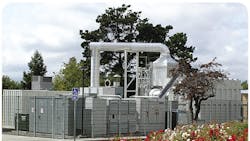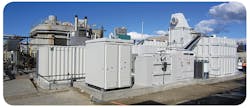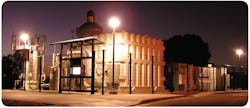FuelCell Energy Improves Reliability with New Approach to Its Stationary Fuel Cell Power Plants
Energy costs are the second-highest controllable expense behind labor. As such, major power users – such as manufacturers, hospitals and universities – are increasingly realizing the value in practical, on-site distributed electric power generation systems with 24/7 availability. At the same time, government regulations are encouraging more eco-friendly energy solutions.
Fuel cells, a relatively new alternative energy solution, can help large electricity users reduce electricity costs by converting biofuels and natural gases into clean, usable alternating current (AC) power on a power grid.
A fuel cell power plant produces power through the formation of hydrogen from a source fuel – most commonly clean natural gas or renewable biogas. An electrochemical reaction takes place when the fuel is combined with oxygen to produce direct current (DC) electrical power and usable high-quality heat suitable for making steam. The DC power is then inverted and conditioned to form utility-grade AC power through the use of a grid tie inverter. To meet local power needs for grid support, voltage levels are increased, and switching and protection equipment for the electrical service interconnect is provided.
For example, a sustainable onion grower in the United States wanted to reconfigure the disposal of onion waste. Onion waste, when spread on a field to decompose, emits methane and other harmful greenhouse gases. After working with FuelCell Energy – a leading manufacturer of ultra-clean stationary fuel cell power plants for commercial and industrial companies, as well as government buildings and utilities– the onion grower was able to convert methane gas captured in an anaerobic digestor to AC power for use to power their operations.
Using the fuel cell power plant has helped the onion grower virtually eliminate the emission of pollutants and cut energy costs by generating electricity 24 hours a day with up to twice the efficiency of conventional fossil fuel plants – all with virtually no air pollution.
Because it is liquid cooled, the PowerFlex 700L drive is very compact and could be easily packaged into a sealed outdoor enclosure, which extends the life of the electrical equipment.
FuelCell had previously dealt with repeatability problems from using control system products supplied by three separate vendors, including non-compatible technologies, obsolete systems and competing standards. The company knew that standardizing on one commercial design to help convert DC to AC power would help eliminate those issues, and make it easier to maintain and service its products across the world. However, standardizing would also require design changes in terms of size and components.
Most importantly, FuelCell needed to ensure that the power plants were built up to varying international standards. Utilities also require that energy from fuel cell power systems doesn’t adversely affect the power grid, and supplies clean, well-filtered power. To ensure each fuel cell is operating properly and providing sufficient power, FuelCell needed rigorous testing capabilities.
All this, while increasing the reliability of the fuel cell systems and reducing the Total Cost to Design, Develop and Deliver each system.
Early on in the development of the most recent commercial fuel cell power plant design, FuelCell Energy decided to involve Rockwell Automation for engineering support. The company had worked with Rockwell Automation in the past and was confident that the Rockwell Automation Low Voltage OEM Drive team could help them implement a robust and standardized solution with excellent reliability.
Both teams worked together to develop the best approach and combine the expertise of FuelCell Energy and Rockwell Automation. FuelCell Energy utilized its extensive knowledge in alternative power systems, including current regulations and future requests from customers and utilities, and Rockwell Automation tapped into its automation experience with AC inverters, testing capabilities and global support.
“Rockwell Automation has one of the most formal, rigorous engineering processes I’ve seen,” says Nolan Rabinowitz, Manager, Project Procurement, FuelCell Energy, Inc. “The level of engineering support – from production up through quality control – has been a very positive experience.”
For much of the fuel cell design, FuelCell Energy’s experience helped FuelCell develop an effective new power system, but the company needed help converting the DC power generated within the fuel cell to AC power for the grid. That’s where Rockwell Automation came in.
We believe the inverter we’ve developed with Rockwell Automation is the best-in-class solution for stationary fuel cell power plants.—Nolan Rabinowitz, Manager, Project Procurement, FuelCell Energy, Inc.
To convert DC power to AC power within the fuel cell, engineers chose the Allen-Bradley PowerFlex 700L variable frequency drive. Because it is liquid cooled, the PowerFlex 700L drive is very compact and could be easily packaged into a sealed outdoor enclosure, which extends the life of the electrical equipment. The final solution includes a custom enclosure that meets the reliability and dimensional requirements of the application.
“We didn’t buy an off -the-shelf product,” says Rabinowitz. “The PowerFlex drive and drive box needed to be customized to fit our fuel cell power plant, and Rockwell Automation did an excellent job meeting our needs.”
An Allen-Bradley CompactLogix programmable automation controller – along with the drive and various other components – is responsible for coordinating the connection of the grid tie inverter to the utility and monitoring the power delivered from the fuel cell to the grid. The controller tightly integrates with programming software and Intelligent Motor Control products to provide reliable power output and quality measurements to FuelCell Energy. The company uses the information to provide 24/7 remote monitoring and support capabilities to ensure international standards are met from its Danbury, Conn., headquarters.
The new solution has been remarkably reliable– supplying continuous power with minimal downtime.
“Rockwell Automation is a great partner for us with their focus on providing a total solution, their responsiveness, their attention to continuous improvement, and their commitment to innovative product development in support of fuel cell market expansion,” says Rabinowitz. “We believe the inverter we’ve developed with Rockwell Automation is the best-in-class solution for stationary fuel cell power plants.”
FuelCell and its customers also appreciate the ease of installation and serviceability of the new systems. “I’m confident that as FuelCell Energy continues to grow and expand globally, Rockwell Automation will continue to provide global services and a high level of support to us and our customers,” says Michael Lisowski, VP Supply Chain, FuelCell Energy. Inc.
The results mentioned above are specific to FuelCell Energy’s use of Rockwell Automation products and services in conjunction with other products. Specific results may vary for other customers.


